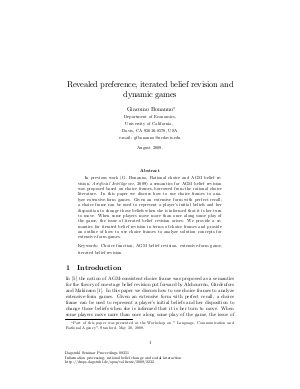Revealed preference, iterated belief revision and dynamic games
Author Giacomo Bonanno
-
Part of:
Volume:
Dagstuhl Seminar Proceedings, Volume 9351
Part of: Series: Dagstuhl Seminar Proceedings (DagSemProc) - License:
 Creative Commons Attribution 4.0 International license
Creative Commons Attribution 4.0 International license
- Publication Date: 2009-11-04
File

PDF
DagSemProc.09351.7.pdf
- Filesize: 160 kB
- 10 pages
Document Identifiers
Subject Classification
Keywords
- Choice function
- AGM belief revision
- extensive-form game
- iterated belief revision
Metrics
- Access Statistics
-
Total Accesses (updated on a weekly basis)
0Document
0Metadata
Abstract
In previous work (G. Bonanno, Rational choice and AGM belief revision, Artificial Intelligence, 2009) a semantics for AGM belief revision was proposed based on choice frames, borrowed from the rational choice literature. In this paper we discuss how to use choice frames to analyze extensive-form games. Given an extensive form with perfect recall, a choice frame can be used to represent a player's initial beliefs and her disposition to change those beliefs when she is informed that it is her turn to move. When some players move more than once along some play of the game, the issue of iterated belief revision arises. We provide a semantics for iterated belief revision in terms of choice frames and provide an outline of how to use choice frames to analyze solution concepts for extensive-form games.
Cite As Get BibTex
Giacomo Bonanno. Revealed preference, iterated belief revision and dynamic games. In Information processing, rational belief change and social interaction. Dagstuhl Seminar Proceedings, Volume 9351, pp. 1-10, Schloss Dagstuhl – Leibniz-Zentrum für Informatik (2009)
https://doi.org/10.4230/DagSemProc.09351.7
BibTex
@InProceedings{bonanno:DagSemProc.09351.7,
author = {Bonanno, Giacomo},
title = {{Revealed preference, iterated belief revision and dynamic games}},
booktitle = {Information processing, rational belief change and social interaction},
pages = {1--10},
series = {Dagstuhl Seminar Proceedings (DagSemProc)},
ISSN = {1862-4405},
year = {2009},
volume = {9351},
editor = {Giacomo Bonanno and James Delgrande and Hans Rott},
publisher = {Schloss Dagstuhl -- Leibniz-Zentrum f{\"u}r Informatik},
address = {Dagstuhl, Germany},
URL = {https://drops.dagstuhl.de/entities/document/10.4230/DagSemProc.09351.7},
URN = {urn:nbn:de:0030-drops-22326},
doi = {10.4230/DagSemProc.09351.7},
annote = {Keywords: Choice function, AGM belief revision, extensive-form game, iterated belief revision}
}
